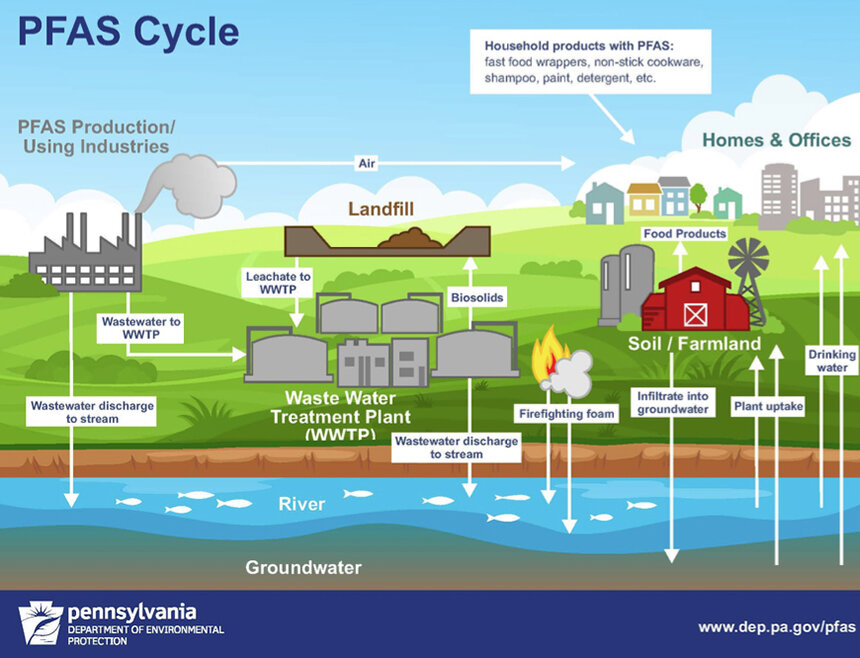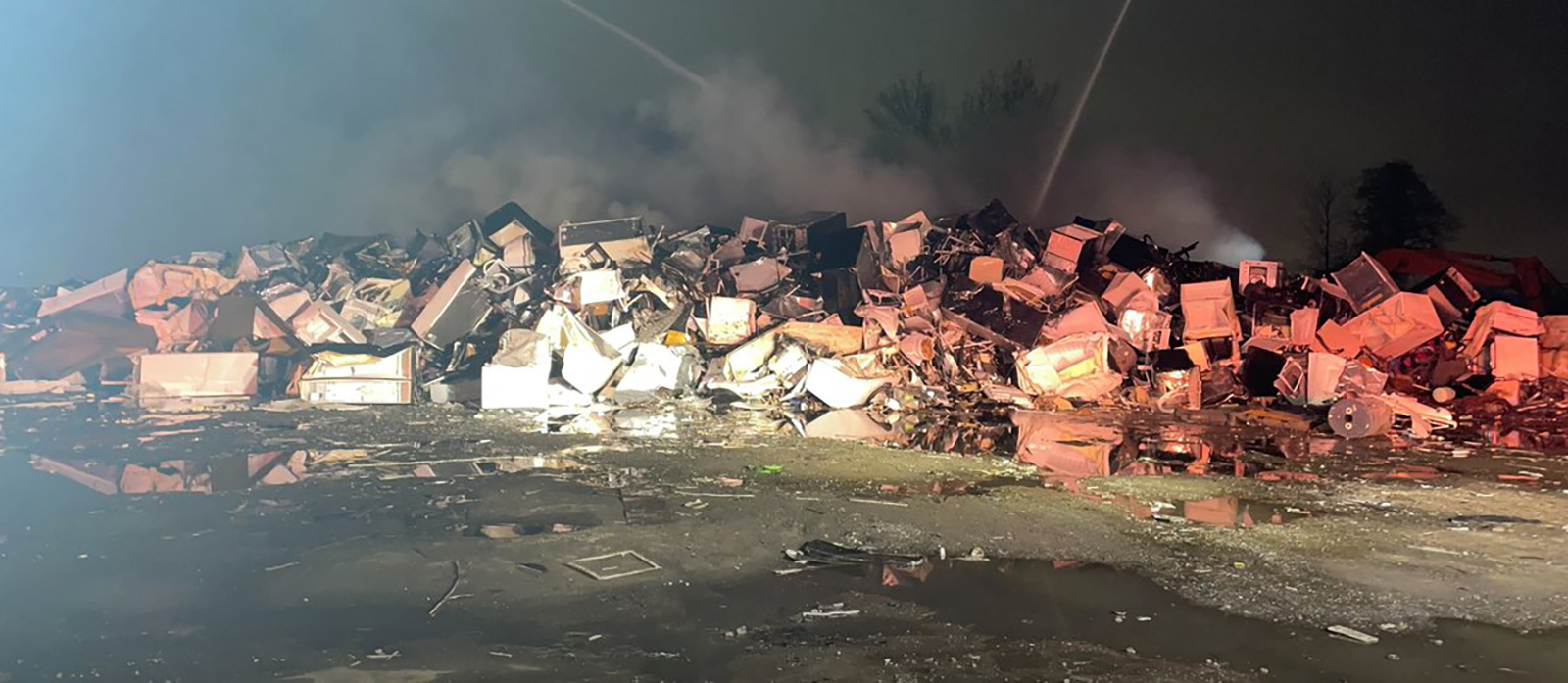Roadside Litter Piling Up: Give a Hoot, Don’t Pollute
Someone ends up picking up those bottles filled with urine and tons of other needless street trash, and it costs taxpayers plenty
November 24, 2015
Today’s environmental advocates are working toward zero waste, more renewable energy, complete streets, organic fruits and vegetables, and local food systems. Juxtaposed against these big-picture efforts aimed at systemic change, is an ongoing, often-forgotten, 20th-century effort that simply seeks — and has largely failed to secure — minor behavioral changes.
“The mess people throw out the windows of their cars is as epidemic as it ever has been. You wouldn’t believe how much junk is hidden off the side of the highway. People are throwing a ton of garbage out their windows all the time.”
So said Kevin Nursick, spokesman for the Connecticut Department of Transportation (ConnDOT), who recently spoke to ecoRI News about the pervasiveness of roadside litter.
He said roadside litter has three primary sources: casual litterers; people who dump larger quantities of garbage and bulky items; and truck drivers who fail to secure their loads.
“We find everything,” Nursick said. Styrofoam coffee cups, cigarette butts, paper and plastic bags, soda and beer cans, plastic water bottles, hypodermic needles and other drug paraphernalia were described as everyday finds by Nursick and DOT representatives from Massachusetts and Rhode Island.
“We find horrible biological stuff you don’t even want to consider,” Nursick said. “People go to the bathroom in bottles and then throw them out the window. So it’s not gatorade (our crews) are cleaning up, its human urine.”
Asked to corroborate this claim, Scott Wilson, director of roadside operations for MassDOT, said his crews don’t investigate the liquids inside of the bottles they collect, but noted that “there are people who tend to improperly dispose of some really disgusting things.”
Common items illegally dumped include mattresses, furniture, electronics, construction debris, such as roofing shingles, and bags of trash. “People dump entire pickup-truck loads under bridges or on lesser traveled rural roads, then take off,” Nursick said.
Dumping is a problem in both urban and rural areas, he said. Pull-off areas along highways or lightly trafficked access roads to recreational areas are notorious for illegal dumping, he said.
Charles St. Martin, an employee in the Office of Communications and Customer Service at Rhode Island’s DOT (RIDOT), said he recently spotted a bath tub abandoned along Route 3.
The third category of roadside garbage includes items that fall off trucks or out of Dumpsters while they’re being hauled because the loads aren’t properly secured or covered. A few months ago, MassDOT recovered a 38-foot extension ladder that had flown off a truck on a highway, according to Wilson.
More unusual items found on southern New England’s state roads range from guns to house pets — dead and alive. Wilson recently spotted an 8-month-old puppy sitting in a highway median. It was taken to a local animal hospital and later reunited with its owners.
“If we did not perform litter removal on the highway for a year …” said Nursick before trailing off while he imagined the scene. “Pick your favorite third-world country and that’s what it would look like. It would be a pigsty and the public would be utterly infuriated, screaming for the DOT to get out there and clean it up.”
Accounting for apathy
Connecticut estimates that it spends about $2 million annually on roadside litter and graffiti removal. MassDOT just increased its annual litter removal budget from $1 million to $1.3 million, but that doesn’t include staff salaries since no one at MassDOT is strictly assigned to roadside litter removal, according to Wilson. RIDOT estimates it spends $1 million on removing roadside litter annually.
In total, the region’s three DOTs are spending more than $4.3 million cleaning up other people’s garbage.
As a whole, the cost of roadside litter removal is even higher, because each DOT is only responsible for state-owned roads, none of the cost estimates include clean-up efforts along local roads initiated by municipalities or civic groups. RIDOT manages about 1,500 miles of state roads, but St. Martin estimates that there are about 6,000 miles of road in Rhode Island.
“Most of the roads in the state are managed by cities or towns,” he said.
In Massachusetts, the ratio of locally owned roads to state roads is 10 or 15 to one, Wilson estimated.
Additionally, Nursick noted that his estimate doesn’t include costs incurred by the Connecticut Department of Energy and Environmental Protection to remove illegally dumped items on state-forest roads, which, he said, get targeted frequently.
Department of Trash Removal
Responsibility for cleaning up the mess made by inconsiderate or oblivious drivers on state roads, which include interstates such as I-95, falls on the region’s DOTs. In each state, sponsor-a-highway and adopt-a-highway programs, inmate crews and DOT employees play a role in keeping the highways looking neat.
Sponsor-a-highway programs generally focus on major roadways and require the sponsoring company to hire a third-party company to complete the litter removal. Crews clean the same stretch of roadway between four and 24 times a year, depending on which state the stretch of road is located and the rate of litter accumulation along that stretch.
Adopt-a-highway programs generally focus on secondary roads, on- and off-ramps and rest areas. They enlist civic groups and volunteers to remove litter from the roadside a few times a year. Signs recognizing the groups’ efforts are installed by DOT along the adopted stretch of roadway.
Inmate crews do most of the heavy lifting in each of the three states. In Massachusetts, inmate crews remove roadside litter every weekday, weather permitting. They often clean the same roadway three to five times in one year, according to Wilson.
In 2014, RIDOT coordinated 941 inmate crews over 163 days, according to St. Martin.
“The inmate crews do phenomenal work,” Nursick said. “It’s not easy picking up garbage that other people throw out the window. It’s disgusting work. You want to take a shower immediately after your finish.”
Wilson said litter removal is done with gloves and litter grabbers. “We don’t let people pick up litter with their bare hands. It’s not an easy job,” he said.
Litter removal begins after the last snow melts and continues until the cold weather returns. The region’s DOTs schedule litter removal ahead of mowings, and based on need.
Illegal dumping incidents are handled by DOT staff. ConnDOT clears multiple dumping incidents a week, according to Nursick. In some instances, so much garbage is dumped that a front loader and dump truck are sent to haul it away, he said.
Some areas are hot spots that get hit repeatedly. When lesser-used roads, such as a road to a fishing spot, get trashed repeatedly, ConnDOT sometimes closes the road permanently.
“It’s a great way to get places like that closed down. Block it off with a barrier and keep everybody out,” Nursick said.
The region’s DOTs also play a support role for the sponsor- and adopt-a-highway programs and the inmate programs by coordinating schedules, placing cones, providing traffic control and collecting the trash bags left by the people picking up the litter.
In the past three years, MassDOT has collected an average of 90,000 bags of garbage annually, or some 360 tons, according to Wilson. RIDOT averages 65,000 bags a year, according to St. Martin. ConnDOT doesn’t count the bags of garbage it collects annually. None of the region’s DOTs quantify bulky items removed.
Despite best efforts, litter removal remains a never-ending chore. “No one likes doing something that they know they will have to do again in two weeks,” Wilson said. “That amount of repetition can wear on people.”
Unintended consequences
Besides the monetary costs of roadside litter, there are a number of hidden concerns. Most notably, people who litter roadways indirectly place other people in harm’s way.
“(Roadside litter removal) is dangerous work. People can and have been killed picking up garbage that somebody else dumped on the roadside,” Nursick said.
Some of the environmental consequences of litter are obvious, but others are less visible. Wilson said trash clogs storm drains, creating flooding issues, and that when the drains are cleared, the material must be disposed of in a special way since the mud and sand is mixed with trash.
Litter removal also makes the DOT less efficient. Prior to mowing, litter crews often need to clean up the area to prevent the garbage from being chopped up into tiny pieces.
“It delays or stops us from doing the work we should be doing,” Wilson said.
The regions DOTs are responsible for the roadway-litter problem after the damage is done. “A lot of people want to fix this problem, so they’ll organize cleanups — and that’s important — but if we never put effort into prevention, or change people’s mindsets about littering on the highway, it’s just a Sisyphean task,” Wilson said.
MassDOT is increasing its prevention efforts, including public service announcements, outreach to truckers and haulers about securing loads, and working with the state Department of Environmental Protection, which has had success keeping shorelines clean, according to Wilson.
St. Martin said RIDOT emphasizes cleaning messy stretches of roadway quickly to prevent copycats. “When the roads look cleaner, people are less likely to contribute to the trash than if it’s dirty,” he said.
Littering, dumping and failing to secure a load are each fineable offenses, but catching people in the act is challenging, Wilson said.
Nursick was the least hopeful that change could be achieved.
“If people don’t understand the basic principle that throwing garbage on the ground is wrong, they’re beyond reach,” he said. “People know they shouldn’t do it, but do it anyway. I think it’s selfishness, you decide you’re going to let someone else pick up after you. (Roadside litter) is low on the list of problems the world is facing, but filth created by wanton disregard for the environment that we all have to live in is just disgusting.”




Is there a hotline we can call to report observations of people throwing trash from their vehicles?
What has happened to fines? There used to be $500 + fines posted and enforced for anyone caught littering. A police detail near any Mall would find a LOT of plastic bags being whipped out of cars, etc. With so many cameras on the highways, at lights, etc., why are the abusers penalized? I don’t want my tax dollars spent this way. I am ashamed to see how horrible the roadside litter accumulates, and agree with the article. What about TV advertising? "Litterbug, litterbug, shame on you" was one ad that ran when I was young. My parents would have punished me for littering and especially throwing something out the car winder. What can we do to reinstitute what has been undone since the ’60’s/70’s. It was DRILLED into us that littering was a crime against nature.
People just don’t care. Young people aren’t taught that you don’t litter . It is probably because of the permissive society that we live in today. When I was young if I littered my parents would MAKE me pick it up if I didn’t I would get a crack on my backside. Today if you crack a child on their backside you get arrested go figure. How many tickets are given in RI by local and state police for littering ? I’d like to know the answer to that. Have you ever heard of a garbage disposal company being fined for all the litter they leave behind when they empty trash barrels or the trash that flies out of their trucks onto our roads?
I live on a major road in my community and I pick-up trash thrown on my property constantly especially cigarette butts and fast food containers. I’ve even had this trash thrown out of car windows unto my property while I was standing there. I ask them to please pick it up and you should here what they call me. What is the answer please tell me?
It’s baffling to know why people are so careless with the way they litter. I wouldn’t advise anyone to pick up trash along a highway….too dangerous but we can keep our neighborhoods cleared of litter.
One of the problems with collecting litter is ….who will pick up the bag of trash? Would a local business or store allow you to use their paid-for dumpster? Maybe, but they pay for that dumpster so don’t use it with out permission.
Hey! If someone could transport that bathtub, maybe a plumbing supply house could use it for a very nice outdoor planter.